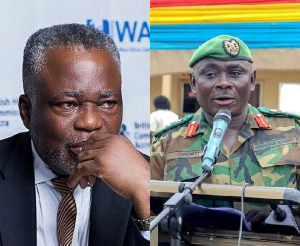I heard the discourse about Ghana’s soaring debt portfolio in a parliamentary debate led by the Hon Isaac Adongo, MP for Bolga Central. The spirited and vociferous MP was arguing about the lack of integrity in the Akuffo Addo-led government’s figures on the nation’s debts, and blaming them for attempting to cover up the real debt figures.
He also pointed to the misinformation of the Ghanaian people by the government’s communication team. Mr. Adongo’s admonitions were scary because going back to the IMF won’t be pleasant news for many Ghanaians.
The crux of the matter being the fact that Ghana’s public debt had ballooned from Gh?122billion, when the NDC left office in 2016, to Gh?198billion as at March 2019, within 3years of NPP in office. Naturally, any Ghanaian confronted with these figures would be alarmed because of its description - DEBT, and its consequences on the economy both medium to long term.
Many Ghanaians believe that aside the dire pressure on the economy, reckless borrowing would injure the reputation of the country and redirect us back to the IMF to meet stringent conditionalities.
Towards the 2016 elections, the debate at some point centred on the then government’s increasing appetite for borrowing. Borrowing was considered not too good for the country. Led by Hon Fiifi Kwetey, the Mahama-led NDC government struggled to explain to Ghanaians that they were borrowing to invest in order to expand the infrastructure needs of the country which in effect will improve the economy. These arguments didn’t go down well with the then opposition NPP.
Many people then held the view that the Mahama-led government was doing well in expanding the infrastructure base of the country, therefore it was only good as an opposition party to raise issues against the borrowing in order to stop them at some point, especially during an electioneering year.
Today, we are back to the same cycle where the current government too is fighting back on the same charges of alleged reckless borrowing and ballooning our national debt portfolio. It’s visible that apart from the two celebrated flagship policies of Free SHS and Planting for Food and Jobs, the NPP government is working to beat the infrastructure record of the NDC when the SINO Hydro comes on board, to justify the renewal of its mandate next year.
Undoubtedly, these two parties would always come into government with a litany of campaign promises to fulfil, which all cannot be met by the tax revenue alone, except borrowing in addition. From this perspective, who is to decide who is borrowing too much or too recklessly? Is it NDC or NPP who will hold the barometer at a given time, when either of them is at the other side of the aisle?
As civil society, I was convinced then, as I am convinced today that the government’s path for expanding the economic base through increased infrastructure investment is the smartest way to grow the economy. Thanks to dissipation, wastage and corruption our own internal resource generation cannot meet our development budget.
Smart borrowing is the optimum path for all governments because our three major base for the nation’s revenue namely taxes, direct foreign investment and natural resources could no longer support our big dreams and desire for freebies.
Interestingly, many Ghanaians got so confused, because our country’s leaders, from both aisles of the political divide must get a little more consistent in the debate about our sovereign borrowings and the management of the economy to encourage the electorates to have some confidence in them.
In reality, and in economic management, borrowing is not a bad thing to do when running a country. The NPP knew it then in opposition, and the NDC also knows it now in opposition. Therefore it would rather help the process to focus the discourse on the real issues: what did we borrow to do? At what cost per project? Whether it’s economically viable? Etc. etc. These questions would help to shift the debate into tangible issues of due diligence, value for money and whether the borrowing is in the interest of Ghana or otherwise. Ghanaian leaders must move above ‘’ you do me, I do you, politicking’’ and focus on the real issues and support the growth trajectory.
This reminds me of Archbishop Duncan William’s opinion on our leaders in Ghana on his recent featuring on Good Evening Ghana programme. To wit he said our leadership and politics are bedeviled by the pull-him-down syndrome. Parties in opposition spend their time sabotaging those in government. This kind of politics, he said, would stagnate Ghana perpetually.
Just like the energy and petroleum sectors, political parties should be careful when discussing issues of borrowing because the size of our dreams are bigger than what our economy can afford.
At anytime in our criticisms, we should not only focus on the increasing debts, we should also celebrate the pronounced infrastructure investment increases and innovations in the country that increases our competitiveness in the sub-region and position Ghana as the gateway in West Africa.
Therefore, smart borrowing, across all governments, is imperative yesterday, today, and tomorrow in order to keep decaying public infrastructure in good shape, meet citizens development aspirations and support Ghana’s human capital base for sustainable development.
The author is the Executive Secretary of Northern Development Institute (NDI Ghana), formerly NOGAID Ghana, a Tamale-based development organization. He also chairs the Boards of four corporate entities.
Opinions of Thursday, 18 July 2019
Columnist: Mustapha Sanah



















